In the ever-evolving aviation industry, airlines are grappling with the dichotomy of profitability and customer service in a post-pandemic world. JetBlue Airways, a carrier known for its innovative service offerings, has recently made significant adjustments to its flight operations, demonstrating a strategic pivot aimed at stabilizing its financial health. By reducing unprofitable routes and reallocating resources, JetBlue seeks to navigate the challenges imposed by increased competition, especially from legacy carriers dominating key markets.
The recent announcement of flight cutbacks indicates JetBlue’s commitment to recalibrating its business model. The decision to cease operations between Fort Lauderdale and Jacksonville, as well as several routes from JFK to major destinations such as Austin and Miami, reflects a focused effort to eliminate inefficiencies. This strategic pruning underscores JetBlue’s recognition of market realities; competing against established airlines in congested routes has not yielded profitable outcomes, particularly in Miami where legacy carriers wield substantial influence. Such cancellations not only aim to cut losses but also serve to realign JetBlue with its core strengths in markets where it can operate more competitively.
JetBlue’s plan to redeploy its Mint service—a high-value business travel solution—towards better-performing markets signals a shift in operational strategy. The decision to withdraw from Seattle flights outfitted with this premium offering indicates an effort to leverage the Mint product in geographically strategic locations rather than spreading resources thin across underperforming routes. Furthermore, as JetBlue prepares to announce new international services, particularly in Europe, it highlights a calculated risk that stands to enhance its portfolio with stronger revenue potential.
Despite recent improvements in revenue and bookings—metrics that enabled a notable bump in stock value—JetBlue’s persistence in adapting strategies is commendable. The acknowledgment of losses, especially in the Miami sector where the airline remains in competition with the robust operations of American and Delta, exemplifies the grounded approach the leadership is taking. CEO Joanna Geraghty’s focus on cost reduction amid operational challenges provides insight into an airline recognizing the importance of agility in its services, particularly as consumer behavior shifts following the pandemic.
The impacts of such strategic decisions extend beyond mere numbers and into the lives of employees and customers. With job roles potentially affected from operations that are being scaled back, JetBlue has proactively mentioned working with its crew to explore alternative employment opportunities within other operating cities. For customers impacted by route changes, the airline’s willingness to offer flexible options or refunds reflects an overarching commitment to customer service even amidst tough cost-related decisions.
In a landscape where success hinges on adaptability and responsiveness, JetBlue’s recent route adjustments and strategic planning underscore an airline determined to thrive in a challenging environment and prioritize profitability while maintaining customer loyalty.


Leave a Reply